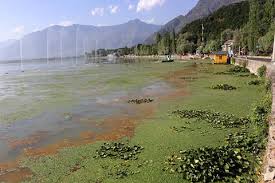Stressing for water conservation, authorities and experts on Thursday said Kashmir was undergoing severe water crisis.
During winter, an unprecedented water crisis unfolded in Kashmir as a lengthy dry spell led to a record low water level in the Jhelum.
The Jhelum, which originates in Anantnag and runs through Srinagar and various northern areas, covering around 200 kms before entering into Pak, is a major source of drinking water and irrigation.
According to experts the scanty rains and receding glaciers have brought Kashmir on the brink of water crisis.
“In Kupwara, Budgam and Bandipora districts there are dozens of villages without drinking water supply,” experts said.
“There is some improvement due to the rains and snow,” chief engineer, Public Health Engineering, Abdul Wahid told Kashmir Post.
However, he hastened to add that “50 per cent crisis is still there and we are hopeful that melting snow will help the situation.”
He said last year some bore and tube wells were drilled to meet the requirement. “This year more bore and tube wells will come up in various areas of the Valley particularly in the upper belts to meet the requirement,” he said and appealed the people to conserve water.
Officials said more than 40 percent capacity of 14 water supply schemes in southern Kashmir division has been affected by receding water levels.
Another reason for the present water crisis, officials said, was the long delay in completion of government of India-funded water schemes.
Under the National Rural Drinking Water Programme (NRDWP), the previous UPA-led Congress government had approved more than 2511 schemes— 934 schemes for Kashmir and 1566 for Jammu— to ensure regular supply of drinking water to people.
But till date only 232 schemes have been completed, officials said.
The union government, officials said, “has cut down the funding under the program and directed the state government to first complete the already taken up schemes before further money can be released.
“This has led to the delay in completion of the program,” said another official.
Meanwhile, environmental experts Thursday expressed concern over the deteriorating condition of water bodies in Kashmir stating that the water is getting polluted with each passing day.
They said that most of the water bodies in the Valley are polluted and nobody is concerned about their preservation and restoration. which has raised many eyebrows in Kashmir.
“Water is polluted by our own people and no one is concerned about our future generation,” a prominent hydrologist Er Aijaz Rasool said in a brief interview with Kashmir Post.
When asked to speak on the World Water Day he said that the condition of River Jhelum, Wular, and Dal Lake is alarming this time.
Rasool said there is a need to educate and aware people about the importance of water bodies and causes of the water pollution.
“Although, the government has banned the sale and purchase of polythene but we can easily find it in every nook and corner of the Valley,” he said.
He said that the governments must come with a strict policy to preserve water bodies.
“The government itself is polluting the water bodies by putting solid waste at many locations in these water bodies,” he said.
This year’s theme for the World Water Day is ‘Nature for Water – explore how we can use nature to overcome the water challenges of the 21st century’.
Er Rasool said that water is related to nature and “we have to find solution by which we can preserve the quality and quantity of water”.
“Water bodies are the worst affected by human interference and rapid urbanization. Due to massive erosion in the catchment area these lakes are accumulating silt, thereby converting water bodies into landmasses,” he said.
Another environment expert, Mohammad Junaid said that River Jhelum is carrying poisonous water and it has become a “sewage drain.”
“There is a complete failure from the government side. They have no systematic way of dumping garbage and solid waste is openly dumped in water bodies,” he said.
Junaid suggested measures like de-siltation of water bodies and forestation programs in catchment areas of the River Jhelum.
A senior official at Public Health Engineering (PHE) Department said that in 75% of existing water supply schemes in the State there are no water testing equipment.
“Due to that people are prone to water-borne diseases and infections that is why we see hepatitis cases rising in the valley,” the official said.
In October last year, Peoples Environment Council (PEC), a non-governmental organization had also said that Jhelum carries poisonous water and cannot be used for drinking purpose.
The need of the hour is to generate awareness for preserving the water bodies that are facing many challenges from many quarters.






